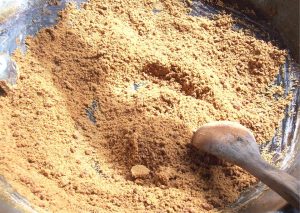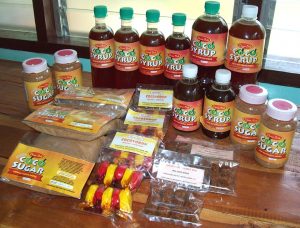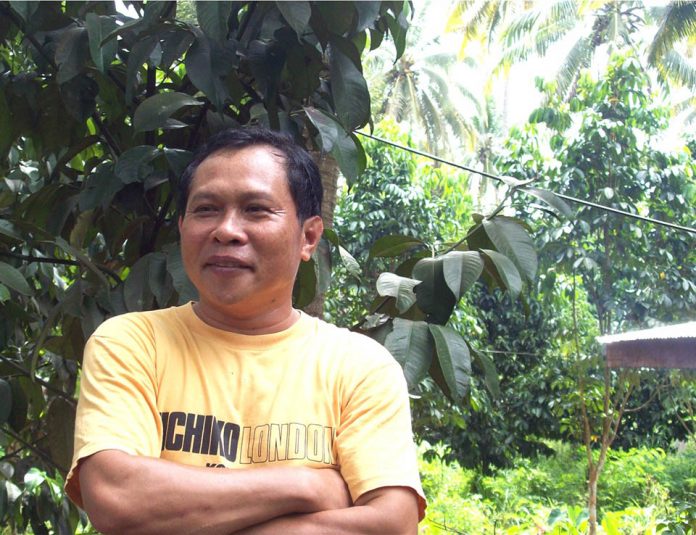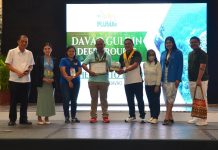When Benjamin R. Lao inherited the 5-hectare farm land in barangay Eman in Bansalan, Davao del Sur, from his parents in 1998, there were already coconut trees growing. Every three months, he harvested from as low as 400 to as high as 600 nuts. Since commercial fertilizers were very expensive, he planted different nitrogen fixing species like Flemingia macrophylla, Desmodium rensonii and Indigofera anil in various parts of the farm.
The leaves from these leguminous shrubs that fell below the ground became instant organic fertilizer for the coconut trees. Several months later, the coconut yields markedly increased to 15,000 nuts per quarter. “Some of my neighbors told me it was a miracle,” Lao says.
Although the money he made from copra was good, he wanted to earn more. After attending a seminar conducted by Philippine Coconut Authority (PCA), he thought of producing coconut sugar from the coconut sap or toddy.
Lao learned from the Department of Science and Technology (DOST) that coconut toddy contains 12%-18% sugar in its natural form with important vitamins and amino acids. It is also rich in nutrients and high in potassium. Phosphorus, magnesium, sulfur, calcium and vitamin C.
The flowers of the coconut tree provide the sap that is made into sugar. In his research, Lao found out that a coconut tree in good stand can yield an average of two liters of sap daily. At least four coconut trees are needed to produce one kilograms of sugar per day.
“The production of coconut sugar is very simple,” he says. “It is just a natural process of heat evaporation to convert liquid sap to solid form of sugar granules. It requires no complicated and high-cost machineries or equipment nor a huge capital.”

What one thing about coconut sugar is that is all natural. That is why it is recommended to people with diabetes, a disease that afflicts more than 5 million Filipinos. “Coconut sugar has low glycemic index, a measure of blood sugar, thus good for diabetics and those having prostate problems,” Lao says. “It has also glutamic acid, the same ingredient that can be found in Viagra.”
In the beginning, he only sells the locally-produced coconut product inside his farm. Believing there was an untapped market for such product, he hired people and started producing other alternative sweeteners like coco honey and coco sap drink that are used for desserts and other delicacies.
Lao later registered these products with the Department of Trade and Industry (DTI) under the moniker Donnabelle – a combination of the names of his two daughters. He started distributing his products in some outlets in nearby areas and the cities of Davao, Digos, General Santos and Butuan. Outside of Mindanao, his coconut sugar is being sold in Cebu and Metro Manila.
Due to the increasing demand for his products, he decided to incorporate Lao Integrated Farms Inc. in 2009. Since then, he has been exporting his products to the United States, United Kingdom, Australia, and other countries. “My coconut sugar is guaranteed 100-percent free from chemicals,” he assures.
But it’s not only coconut sugar that is very popular abroad. Teriyaki all-dip sauce, another coconut-based product, is also a hit among foreign consumers. People who buy his products are assured that they are fit for human consumption as his farm has earned various local and international organic and safety certifications.
Today, 80% of his coconut products are exported. He credited this achievement to continued research. Despite the success and awards he received, he never stopped doing studies on how to improve the quality of his products.
In fact, he was named by DOST as a magsasaka-siyentista. “As a farmer-scientist,” he says, “I was able to focus on researching about coconut sap products. It took us eight months to study on how to make export-quality coconut syrup.”
Lao has gone a long, long way. The son of a farmer, he used to walk two kilometers to get to his school during his basic education. When he was attending high school, he went to the town proper and helped the poultry business of his aunt.
He went to Davao City and attended the erstwhile International Harvardian University where he got his Political Science degree. He later became a town councilor and then vice mayor of his hometown in Bansalan.
He was working in Davao City as director of the Bureau of Immigration and Deportation but fate intervened. His mother called him to divide equally the 40 hectares of their land among the eight siblings as inheritance. “I am the fifth child but I was unanimously chosen to assign which portion of land should be given to each sibling,” he recalls.
For some unknown reason, Lao selected the land that was so infertile that only cogon grass would thrive on it. His brothers and sisters never bothered to ask him his reasons; they were happy to get their own shares.
“My parents wanted me to be a lawyer,” he admits. “But I wanted to toil the land to produce food to feed my family and earn sustainable income.” In another interview, he says, “Farming is really my first love.”
Lao is not only a coconut farmer; he is also an organic farmer. In his farm, you won’t see his farm workers using chemical pesticides. “I had a tragic experience with chemical pesticides when I was still a teenager while cultivating rice in our farm located at the neighboring barangay,” he reveals.
Instead, he recommends using Eman, an acronym for “epitibo, mura at natural” (effective, cheap, and natural). “This is a concoction composed of fresh goats’ manure, kakawate, makabuhay, and hot pepper,” he says. “These are soaked together for 48 hours and after that the concoction is ready for use.”
According to Lao, Eman is effective in repelling plant pests and diseases. “We are committed to help preserve our environment,” he points out. “We want to teach Filipino farmers through natural method and that is by not using commercial fertilizers or pesticides.”
To people who have been to his farm, they have described it as a haven. You don’t see only livestock and crops but ornamentals as well. “It’s nice to see beautiful flowers underneath the trees,” Lao says. “In addition, the flowers serve as breeding areas for beneficial insects like spiders and dragonflies.”
He believes in adding value to a product. “Value adding is an important component in a farming system,” he explains. “For instance, if you have goats, you must know how to produce fresh milk and having other saleable products from the animals. In the case of coconut, don’t think only of copra because it is cheaper; you can always have another product to sell.”
Aside from his coco-based major products, he also has ice cream using goat’s milk with flavors such as malunggay, turmeric, durian and sour soap. He also incorporates his coconut sugar into a tea: mangosteen tea, malunggay tea, turmeric tea, and lemon grass tea.

His success gone unnoticed. In fact, he received several recognition from different award-giving bodies: Most Outstanding Coconut Farmer from the Department of Agriculture in 2008, Productivity Olympics National Winner in 2009 from the Department of Labor and Employment, Micro Entrepreneur of the Year Presidential Award in 2009, Business Excellence Award from the Bank of the Philippines in 2010, and Organic Farmer of the Year in 2011 from the Department of Agriculture.
Despite all these awards, Lao remains humble. “Even if I now have a higher income,” he says, “I still need to feel the ground beneath my feet. For me, success is measured by how many people you can help.”
In fact, he has employed some 67 regular employees in his farm who are paid higher than other agricultural workers in Davao region. Some of the children of these employees are “scholars of the farm,” who receive 100% tuition subsidy and allowance.
As his farm is located in areas where indigenous peoples abound, he is trying to educate them how to make money and change their communities. As a matter of fact, he once hosted a seminar for the Bagobos and helped them raise their own capital.
Lao is a farmer with an entrepreneur mind. “Have a businessman mindset and always think of the future,” he advises. “Don’t be contented with small things. Even if you’re from a small village, you can always have big dreams.” –








A very great story of become successful business man. . MABUHAY PO KAYO ,at lalo pa KYONG patnubayan ng ating MAHAL NA DIYOS.